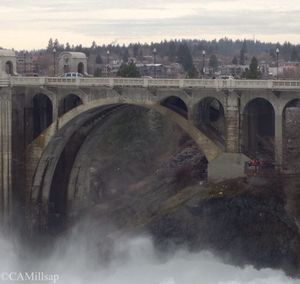Spokane: A raging river is no place to play
Like so many others in Spokane, in the spring I go down to pay my respects to the river. Fed by snowmelt and rain, the Spokane River swells and grows and becomes, seemingly overnight, a powerful monster roaring through the canyon it has chewed through solid basalt.
This dramatic sight draws people of all ages and the spectacle takes your breath away. Water spills over the falls, churns, boils and foams sending curtains of fine mist, droplets of water that ride the wind, coating the bridges, paths and spectators before it rushes on, making its way to fill the aquifer that quenches this thirsty land.
This year, with so much snow and rain falling so late in the season, the river is at its wildest, just under flood stage. We were there on Saturday afternoon and we walked along the path to the viewing platform at the base of the Monroe Street Bridge. That is one of my favorite places to see the falls and feel the incredible power. The land drops away at the edge of the rail, the ground vibrates and the sound makes conversation difficult. We stood for a few minutes admiring the view and taking photos before we strolled up another block to the Post Street Bridge.
From there I noticed a group of boys on bicycles ride down to the place we’d just been. Gathering at the rail, they were roughhousing as boys of that age do, pushing, punching, shadowboxing as they peered down at the water. Suddenly, one of the boys climbed up and dropped over the rail in one fluid motion, landing on the deceptively thin layer of spongy soil covering the slick rocks abutting the concrete arch of the big bridge. He moved to the edge of the steep slope that plunges down to the raging water.
My heart slammed against my ribs and I heard myself make an instinctive, involuntary, sound like a frightened animal. I was terrified he would slip at any minute. The ground was still soaked from days of rain and there was nothing to reach out and grab if he lost his footing. And the river, always dangerous, is completely unforgiving at this stage. Whatever falls into it is quickly gone forever.
I looked for my husband but he was out of sight. I raised my phone to call 911, sure that if I took my eyes off the boy he would be gone when I looked up, but at that moment one of his friends must have called him back because he turned and just as quickly hopped back to safety.
“Oh, you stupid boy.” I whispered. “You stupid, lucky, boy.”
The group stayed another few minutes--long enough for me to snap a photo--and then hopped back on their bicycles and moved on, off to swagger and impress one another in other ways, I suppose.
I finally walked away but I was still trembling.
I keep replaying the scene in my mind, thinking how one wrong step could have changed everything, but I doubt the boy has given it a second thought.
I know this is nothing new.
When my children were that age they laughed at my constant worry. They thought I was simply overprotective, but the truth is, I was unhinged. They had no idea how many dangers there were outside our door and I suppose I believed if I could think of it and warn them against it (whatever it was) I could somehow protect them. New fears would hit me in the middle of the night. What if... What if... What if...
At that age--adolescence and early adulthood--we are vulnerable because we have not yet developed an awareness of just how fragile we truly are. Age, experience, and exposure to the shocking misfortune of others gradually brings on the understanding that at any given moment any of us is fair game to tragedy. Terrible things can happen when we least expect it.
Eventually, wisdom--and with it a greater chance of survival--comes with the understanding that the reckless make themselves better targets. So most of us grow cautious, careful. Some of us become worried mothers and fathers, nagging our children to take care.
Perhaps one day, when he is a man and he’s watching a teenage son drive away, the same lucky boy will remember the day the river didn’t get him and he’ll call out, “Hey, don’t do anything stupid!”
But his boy will not look back, and the words will roll off his back like the clean, cool, spray from a waterfall.
Note: The group of boys mentioned in this column appears in the photo above.
Cheryl-Anne Millsap’s audio essays can be heard on Spokane Public Radio and on public radio stations across the country. She is the author of “Home Planet: A Life in Four Seasons” and can be reached at catmillsap@gmail.com
